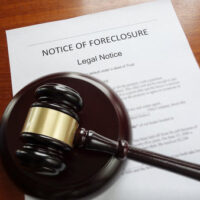Using the Banks’ Argument Against Them

Even today, our legal system is still dealing with foreclosure cases that arose out of the foreclosures crisis that began in the late 2000s. At that time, Desperate homeowners filed wrongful foreclosure actions against their lenders, often attempting to challenge the assignment of the Security Deed or other mortgage documents. For the most part, these challenges were unsuccessful, with Georgia courts holding that where a plaintiff/homeowner is not a party to the document (meaning that it is between two other companies or persons), the plaintiff or homeowner has no standing to challenge it or seek revocation thereof. In Ames v. JP Morgan Chase Bank, N.A., 783 S.E.2d 614 (Ga., 2016), the Supreme Court of Georgia confirmed that a document purporting to affect a security deed could not be challenged by a third party.
“The assignment of a security deed is a contract between the deed holder and the assignee. See Bank of Cave Spring v. Gold Kist, Inc., 173 Ga. App. 679, 680, 327 S.E.2d 800 (1985). And a lawsuit on a contract generally may be brought only by a party to the contract or an intended third-party beneficiary of the contract. See OCGA § 9–2–20.”
Id. Where the assignment in Ames was between two (2) lenders, the homeowners “clearly were not a party to the assignment at issue [there].” Id. The Court held that this was true even though the document affecting the security deed “may affect the [third party] in some ways…” Id. The Court clarified that a third party to a recorded document affecting the security deed has no standing to dispute that recorded document. Id. (“What the debtor cannot do is dispute the assignment; that may normally be done only by the assignor, because the debtor is not a third-party beneficiary of the assignment as a whole and particularly is not intended to directly benefit from the transfer of the power of sale.”).
The experience Marietta foreclosure attorneys at our firm recently handled a case involving the same law but with slightly different facts. In our case, when our homeowner paid off his second mortgage, the second mortgage company accidentally filed a cancellation of the first mortgage – which made it appear as though our homeowners owned the house free and clear of any mortgages according to the public record. When the first mortgage company tried to foreclose on our homeowners, the first mortgage company realized the error in the public records. Rather than taking action directly against the second mortgage company (who undisputedly created this error), the first mortgage company named the homeowners in an action seeking an order from the Court that the public records be amended to correct the error.
However, just as the third-party in Ames above, the first mortgage company was not a third-party beneficiary or party to the Cancellation at issue and may not challenge the terms of the Cancellation. See also Nelson v. Hamilton State Bank, 331 Ga. App. 419, 771 S.E.2d 113 (Ga. App., 2015); Jurden v. HSBC Mortg. Corp., 330 Ga. App. 179, 765 S.E.2d 440 (Ga. App., 2014). As you can see, this is the same argument that the lenders used in countless wrongful foreclosure cases against the clients of our Marietta foreclosure attorneys. Under the reasoning of the Supreme Court of Georgia (which the banks fought so hard for), the bank that has wrongfully had its Security Deed cancelled has no standing or right to challenge that cancellation.
This case is currently on appeal to the Court of Appeals of Georgia. While we recognize that the Court of Appeals is not likely to overturn the line of cases following the reasoning in Ames, we are simply asking that the Court apply the reasoning uniformly to lenders and homeowners as required by law.
The Marietta foreclosure defense attorneys at The Strickland Firm can help you understand your options going forward, and protect your rights if trial becomes necessary. Contact the offices today for a free consultation.
